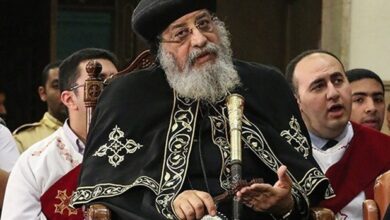Last week, Al-Qaeda militants in Iraq threatened to attack Egypt’s Coptic minority in the wake of a massacre at a Baghdad church that killed 58 people. As a result, Egyptians became anxiously preoccupied with staying safe. But what's the proper response to such a threat? Yes, the role of Egyptian security is key in ensuring our safety, but unfortunately that alone is not sufficient.
Security specialists stress that Al-Qaeda does not have a branch in Egypt, as they do Iraq, Yemen and other countries. On the other hand, researchers on Islamist and jihadist groups say that while there isn't an official branch, there may be ideological supporters of Al-Qaeda or organizations like it who could carry out an attack. The reality is that it’s easy to identify organized groups, if there were any here, but it‘s very difficult to target unorganized supporters of Al-Qaeda’s ideology . In this regard, security forces have an important duty to keep us safe, but the role of citizens and the state in containing the spread of extremist ideologies is just as crucial.
This brings me to my next question: How well are we doing to battling intolerant and sectarian ideas? A recent event is worth recalling which may shed light on our current state of affairs.
In an attempt to diffuse mounting sectarian tensions, a group called "Egyptians Against Religious Discrimination" tried to organize a festival, in cooperation with the Al-Mawred cultural foundation, at Al-Azhar park on Friday 29 October. The event was called "Egypt for All Egyptians" and was to includes, art displays, performances and music. After obtaining the necessary permits, event organizers were surprised to learn that security officials decided to cancel the festival at the last minute.
No reasons were provided for the cancellation decision. Instead, a festival which was devoted to national unity and to cultivating a feeling of civic belonging was squashed without justification. Interestingly, this happened on the same day as sectarian protests that nobody in the security apparatus tried to stop.
So are we truly concerned with confronting and overcoming sectarian tensions and sanctifying feelings of national citizenship? Or, are we giving a free hand to those who support extremism and sectarian violence? Security most certainly has a role to play, but so too does civil society and the public at large. Security forces must fight crime and terrorism, while citizens must confront the ideas that breed such actions.
At the end of the day, security wields an enormous amount of control over what Egyptian citizens can and can’t do. Therefore, we must ask whether security alone has done enough to stop religious intolerance in recent years? If not, then those who really care about the country's well-being should be allowed to do their job. Otherwise, the number Al-Qaeda ideological affiliates will continue to increase.
Translated from the Arabic Edition.




